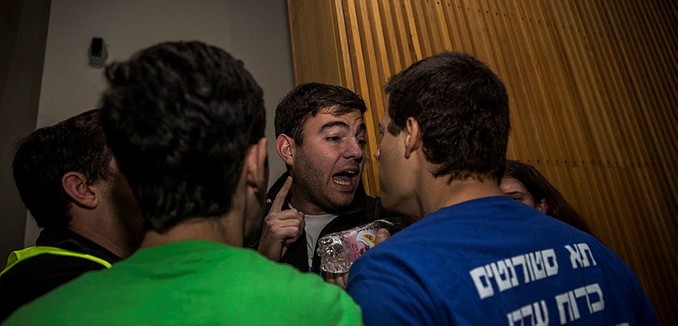The French Consulate in Jerusalem is helping the NGO Breaking the Silence wage a “demonization campaign” against Israel, undermining the Jewish state’s sovereignty and threatening its democracy, Gerald Steinberg, president of the watchdog group NGO Monitor, wrote Thursday in The Times of Israel.
According to Steinberg, in 2015 the French Consulate donated 15,000 euros to Breaking the Silence, a group that has been criticized for sharing anonymous, unverifiable testimonies “[denouncing] the Israeli Defense Forces as war criminals,” primarily before foreign audiences. In a recent Wall Street Journal op-ed (Google link), Steinberg revealed that the group receives the majority of its funding from the European Union.
Steinberg observed that an equivalent situation, in which a group that accuses France of systemic war crimes and works with organizations that support a boycott of Paris would be funded by other members of the European Union, is entirely unrealistic. “[F]oreign governments do not give taxpayer monies to a non-governmental organization (NGO) in another democracy to promote a particular political cause or lobby on legislation,” he explained, before pointing out that some do exactly that in Israel.
By channeling public funds to Breaking the Silence, the French Consulate in Jerusalem, as an arm of the Government of France, is directly facilitating and enabling a demonization campaign against another country that faces terror threats similar to those facing France.
The problem with France and other nations funding groups like Breaking the Silence is that they imbue these organizations with political power that is “unregulated by any checks and balances,” Steinberg wrote.
Steinberg quoted Yair Lapid, head of Israel’s center-left opposition part Yesh Atid, who said of Breaking the Silence, “you lie, you defame, you use anonymous testimonies and foreign funding to damage the country. This isn’t activity for peace, those are fabricated stories aimed to hurt Israel legitimacy.” An NGO Monitor investigation in May exposed Breaking the Silence for taking money from European charities with the explicit instruction that it be used to incriminate the IDF.
The outsized political power exercised by Breaking the Silence and similar organizations is why Israel needs legislation to ensure greater transparency for foreign-funded NGOs, Steinberg argued. The current lack of transparency “makes a mockery of moral justifications for funding Israeli groups like BtS.”
In a recent article published in the Lawfare Blog, Steinberg explained the rationale behind the proposed NGO transparency legislation:
The most important aspect of the bill is the symbolism conveyed by the “foreign agent” designation, particularly in Israel, where sovereignty and self-determination are taken seriously.
In this sense, the proposed legislation is similar in spirit and purpose to US Foreign Agent Registration Act (1938), and the rules adopted last year in the House of Representatives, requiring witnesses testifying before a committee in a “nongovernmental capacity” to disclose “the amount and country of origin of any payment or contract related to the subject matter of the hearing originating with a foreign government.” Such regulations seek to prevent foreign governments from secretive and undue influence over democratic processes, outside diplomatic channels.
Steven Rosen described in The EU’s Israel Problem Goes Far Beyond Labels, which was published in the January 2016 issue of The Tower Magazine, that funding anti-Israel NGOs is one way by which the European Union works to slowly isolate Israel.
But there is another group working in parallel with the BDS movement. It is a far more effective lobby that works quietly behind the scenes in order to accomplish the same goals. This group is embedded in the complex bureaucracy of the EU and its member states—the officials known colloquially as the “Eurocrats.” It focuses on incremental measures rather than advocating a complete boycott of Israel, and it has proven far more successful than its radical counterpart.
Israel’s detractors inside European ministries see Israel’s relationship with the European Union as an opportunity to apply pressure on the Jewish state, rather than a desirable goal in itself. In agencies like the European External Action Service (EEAS—the EU’s foreign ministry) and the European Commission (its executive branch), the officials charged with organizing policy options for the European Council—the heads of government of EU member states—are intensely interested in the Palestinian perspective and highly critical of Israeli policies.
The beliefs of this camp are reinforced by a steady stream of one-sided reports portraying Israel in a negative light. An information pipeline from the Mideast to Brussels is fed by pro-Palestinian advocacy groups operating in the West Bank and Gaza, as well as far-Left Israeli groups allied with them. Many of these NGOs are funded by European governments and foundations, and they work in close consultation with official European envoys in Ramallah and Jerusalem. These envoys integrate the NGOs’ allegations into their own reports and forward them to Brussels and their own capitals. In many cases, the government of Israel does not have the opportunity to vet these one-sided reports.
[Photo: Hadas Parush / Flash90 ]




